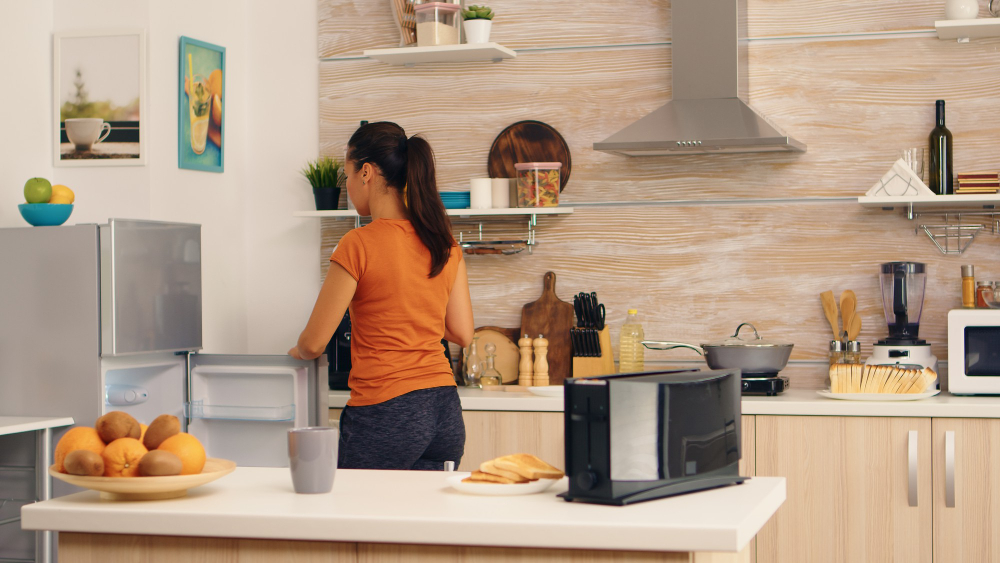5 Tips to Maintain Your Home Appliances
You’re tired of replacing your home appliances, aren’t you? It’s time to learn how to properly maintain them!
These five handy tips will guide you in cleaning, using, inspecting, repairing, and upgrading your appliances.
You’ll save money and extend the lifespan of your investments.
Let’s dive in and make your appliances last longer!
Regular Cleaning of Appliances
While you might think it’s a tedious task, regular cleaning of your appliances can significantly extend their lifespan and enhance their performance. Don’t underestimate the impact of detergent selection. It’s crucial to choose a quality detergent that’s gentle on your appliances but tough on grime. Remember, what works for your dishwasher mightn’t be suitable for your washing machine.
Moreover, disinfection methods shouldn’t be overlooked. We’re not just cleaning for cleanliness’s sake; we’re also aiming to eliminate germs. You can use natural disinfectants like vinegar or commercial ones, depending on the appliance. Always ensure you’re following manufacturer guidelines.
Regular cleaning and proper disinfection can keep your appliances running efficiently for longer, saving you time and money in the long run.

Proper Usage Guidelines
Even though your appliances may seem straightforward to operate, it’s essential you’re using them correctly to prevent unnecessary wear and tear. Don’t overlook the user manual importance. It’s not just a booklet of instructions, but a guide to long-lasting appliances. It tells you the do’s and don’ts, helping you avoid common misuse that shortens their lifespan.
Furthermore, adopt energy efficiency practices. This doesn’t just reduce your energy bills, but also minimizes strain on your appliances. For example, don’t overload your washing machine or keep your fridge door open too long. Don’t crank up your oven to its highest setting unnecessarily. These simple practices ensure your appliances serve you well for years.
In a nutshell, proper usage is key to maintaining your home appliances.
Scheduling Routine Inspections
Besides using your appliances correctly, you should also schedule regular inspections to ensure they’re in good working order. The inspection frequency depends on the specific appliance. For instance, your HVAC system should be inspected at least twice a year, while your washing machine and dryer might only need an annual check-up.
Now, you might be wondering about professional vs DIY inspections. If you’re handy and knowledgeable about appliances, you can do some inspections yourself. However, for complex machinery or if problems persist, it’s better to hire a professional. They’re trained to spot issues that you might overlook, ensuring your appliances run efficiently and last longer.
Addressing Minor Repairs Promptly
When you notice something isn’t working quite right with your appliances, it’s crucial to address these minor repairs promptly. Repair urgency can’t be overstated; these seemingly insignificant issues can escalate into significant problems if ignored. It’s not just about saving money on expensive repairs down the line, it’s also about prolonging the life of your appliances.
You don’t have to wait for a professional for every single hiccup. Some DIY fixes are surprisingly simple and can be done with a quick online search and a bit of patience. For instance, a noisy fridge might just need a fan blade adjustment.
Buying High-Quality Replacement Parts
In light of tackling minor repairs, it’s crucial that you invest in high-quality replacement parts for your home appliances. Don’t be lured by cheap, low-quality parts that can compromise your appliances’ performance and longevity. Instead, prioritize parts compatibility. Ensure that the replacement parts you buy are compatible with your appliances. This not only guarantees optimal performance but also prevents possible damage to other components.
Warranty considerations are another critical factor. Buying parts with a warranty gives you a safety cushion if the part fails or doesn’t fit correctly. Always check the warranty terms before making a purchase. Remember, saving a few bucks on low-quality parts can cost you more in the long run. Invest wisely to maintain your home appliances efficiently.
Frequently Asked Questions
What Are Some Energy-Saving Tips When Using Home Appliances?
You can save energy by using smart thermostats and appliance timers to manage your usage. They’ll help cut down on unnecessary power consumption, keeping your appliances running efficiently and your energy bills low.
How Can I Dispose of Old or Faulty Home Appliances in an Environmentally Friendly Manner?

When disposing of old appliances, consider recycling programs. They’ll properly handle and repurpose your items. If your appliances still work, donation options are available too. You’ll reduce waste and help others in need.
How Can I Child-Proof My Home Appliances for Safety?
To child-proof your appliances, you’ll want to invest in appliance locks. They’ll keep doors shut tight. Also, consider safety gates. Placing them strategically can restrict access to potentially dangerous appliances. Safety’s your top priority.
Are There Any Specific Insurance Policies Available for Home Appliances?
Yes, there are specific insurance policies for home appliances. They offer insurance benefits like repair or replacement costs. You’ll want to check the policy coverage to ensure it matches your specific needs.
What Are Some Tips for Choosing the Most Durable and Efficient Appliances When Buying New Ones?
When buying new appliances, consider appliance brand comparisons. Research durability and efficiency ratings. Budget for appliances that’ll last and save energy. Don’t be swayed by flashy features you won’t use. Quality over quantity always wins.
Conclusion

So, you’ve got the lowdown on keeping your appliances in top shape.
Regularly clean them, use them correctly, and schedule routine inspections.
Don’t ignore those minor repairs – address them promptly to prevent bigger problems.
And remember, when it’s time for replacement parts, quality matters.
Keep these tips in mind and you’ll extend the lifespan of your appliances, saving you both time and money in the long run.
